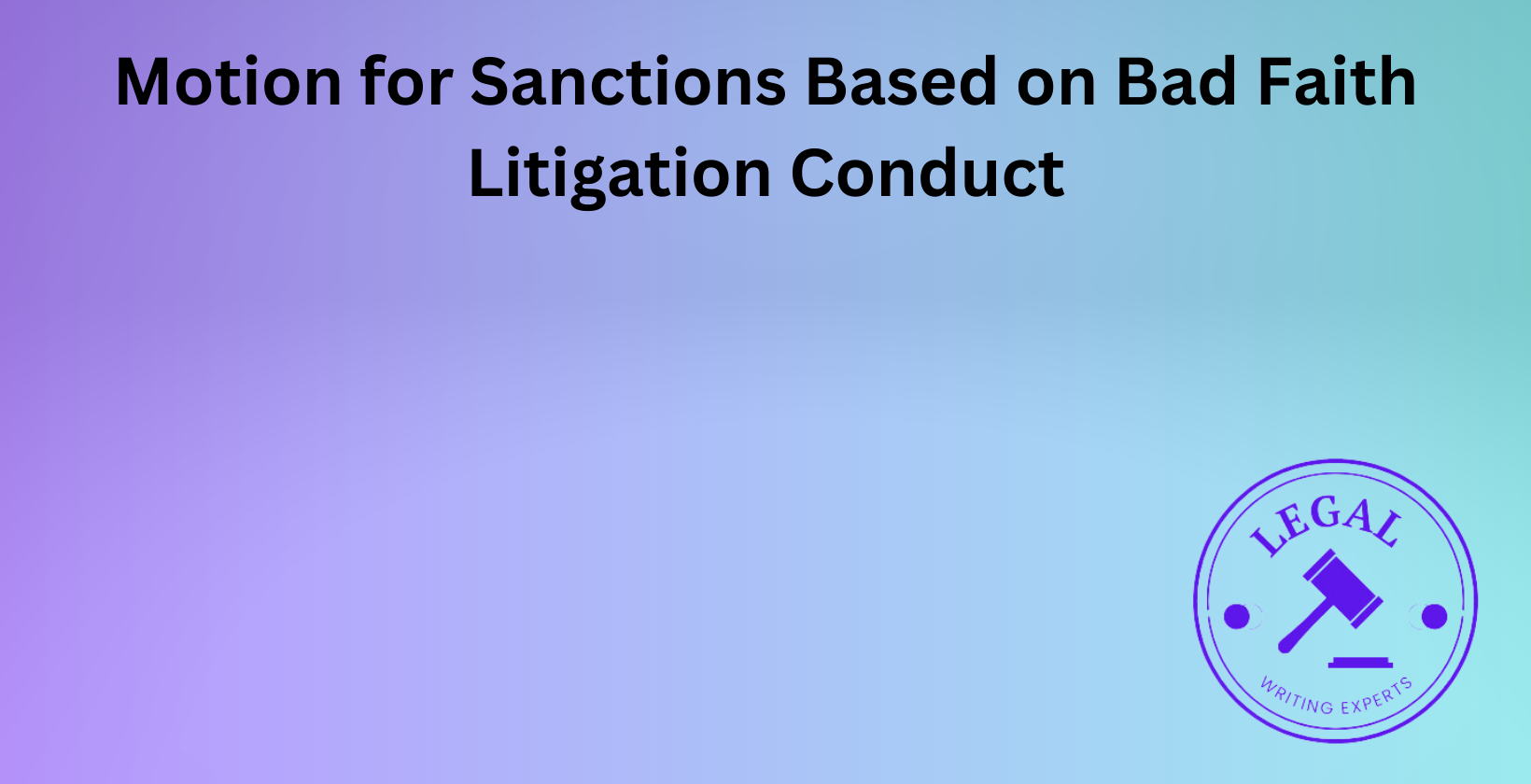Motion for Sanctions Based on Bad Faith Litigation Conduct
Written by
Jessica E
February 06, 2025 · 8 min read

A motion for sanctions based on bad faith litigation conduct is a legal request filed with the court seeking penalties against a party that has engaged in improper or abusive litigation practices. Courts impose sanctions to deter misconduct, protect judicial integrity, and compensate affected parties for unnecessary legal expenses. Understanding the legal grounds, evidence requirements, and consequences of filing such a motion is essential for attorneys and litigants.
What Is a Motion for Sanctions Based on Bad Faith Litigation Conduct?
A motion for sanctions based on bad faith litigation conduct is a formal request to the court asking for penalties against a party that has engaged in deceptive, obstructive, or frivolous litigation behavior. Courts impose sanctions to ensure fairness and uphold ethical standards in legal proceedings. This motion is commonly filed when a party engages in intentional misconduct, such as making false statements, delaying proceedings, or abusing the discovery process.
How Do Courts Define Bad Faith in Litigation?
Courts define bad faith in litigation as intentional or reckless misconduct that disrupts the legal process or unfairly prejudices the opposing party. Bad faith conduct includes filing frivolous claims, making false representations, engaging in unnecessary delays, and refusing to comply with court orders. According to legal precedents, a party acts in bad faith when it knowingly engages in dishonest, obstructive, or oppressive litigation tactics.
What Are the Legal Grounds for Filing a Motion for Sanctions?
The legal grounds for filing a motion for sanctions include deliberate misrepresentations, frivolous filings, improper discovery tactics, and willful disobedience of court orders. Rule 11 of the Federal Rules of Civil Procedure provides a basis for imposing sanctions when an attorney or party submits filings for improper purposes. Courts may also impose sanctions under their inherent authority when a party engages in bad faith conduct that undermines judicial proceedings.
How to Draft a Motion for Sanctions Based on Bad Faith Conduct?
To draft a motion for sanctions based on bad faith conduct, the moving party must outline the specific misconduct, cite relevant legal authorities, and provide supporting evidence. The motion should include a clear statement of facts, applicable legal standards, and a request for appropriate relief. Attorneys must ensure that the motion complies with court rules and procedural requirements.
What Evidence Is Required to Support a Motion for Sanctions?
The evidence required to support a motion for sanctions includes court records, witness testimony, discovery documents, and communications demonstrating bad faith conduct. Documentary evidence, such as emails, affidavits, and deposition transcripts, is critical to proving intentional misconduct. Courts require clear and convincing evidence to justify the imposition of sanctions.
What Are the Potential Consequences of Filing a Frivolous Motion for Sanctions?
The potential consequences of filing a frivolous motion for sanctions include dismissal of the motion, monetary penalties, and reputational harm to the filing party. Courts may impose counter-sanctions against attorneys who abuse the sanctions process by filing baseless claims. Repeated frivolous filings can result in disciplinary action or loss of professional credibility.
How to Respond If You Are Accused of Bad Faith Litigation Conduct?
If accused of bad faith litigation conduct, the responding party should present factual and legal arguments refuting the allegations. Submitting evidence demonstrating good faith efforts, compliance with court orders, and reasonable litigation positions can help counter the accusations. Seeking legal counsel and adhering to procedural requirements are essential for an effective defense.
What Are the Possible Sanctions Imposed for Bad Faith Conduct in Court?
The possible sanctions imposed for bad faith conduct in court include monetary fines, dismissal of claims, adverse rulings, and attorney disciplinary actions. Courts may order the offending party to pay the opposing party’s legal fees or impose non-monetary sanctions such as striking pleadings or limiting evidence. In extreme cases, judges may hold attorneys in contempt or refer them for professional disciplinary review.
How Does Rule 11 of the Federal Rules of Civil Procedure Apply to Sanctions?
Rule 11 of the Federal Rules of Civil Procedure applies to sanctions by prohibiting frivolous filings and improper litigation conduct. Under Rule 11, attorneys and parties must ensure that their submissions are factually and legally justified. Violations of Rule 11 may result in monetary penalties, dismissal of claims, or other court-imposed sanctions to deter future misconduct.
Where Can I Find Legal Assistance to Draft a Motion for Sanctions?
Legal assistance to draft a motion for sanctions can be obtained from law firms, legal writing services, and attorneys specializing in litigation. Many legal professionals offer drafting assistance through law essay writing services, legal research firms, and custom law essay providers such as Legal Writing Experts. Consulting a qualified attorney ensures that the motion meets procedural requirements and is effectively argued in court.
What Is the Process for Filing a Motion for Sanctions in Federal Court?
The process for filing a motion for sanctions in federal court involves drafting the motion, serving it on the opposing party, and submitting it to the court. The moving party must provide legal grounds, supporting evidence, and a request for specific relief. Courts may hold hearings to determine whether sanctions are warranted and issue rulings based on the presented arguments and evidence.
How Can Attorneys Avoid Engaging in Bad Faith Litigation Practices?
Attorneys can avoid engaging in bad faith litigation practices by adhering to ethical standards, maintaining professional integrity, and following procedural rules. Conducting thorough legal research, making truthful representations, and complying with court orders are essential practices. Law firms and legal writing services emphasize ethical litigation strategies to prevent sanctions and uphold the credibility of legal professionals.


